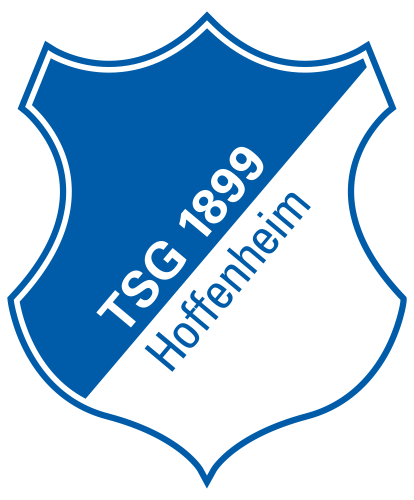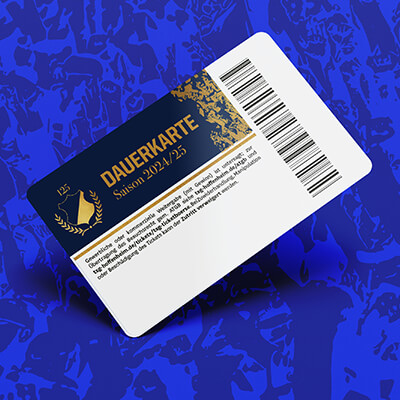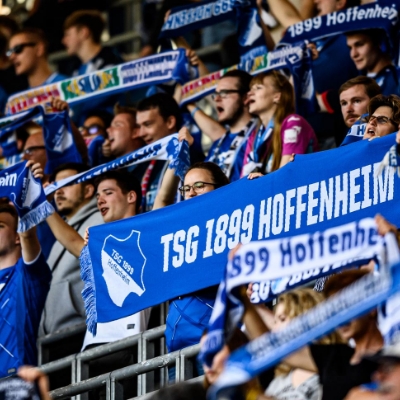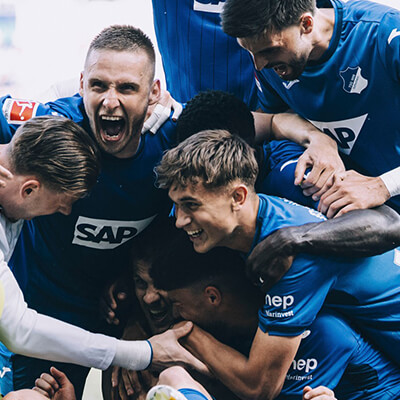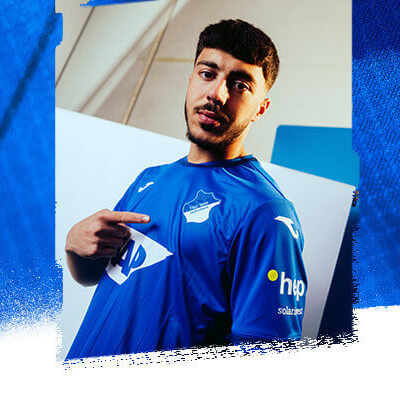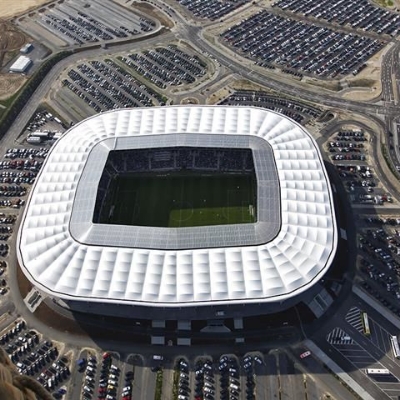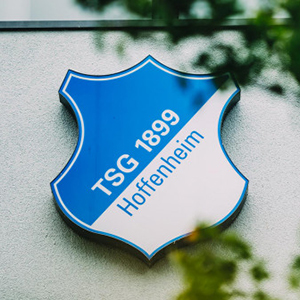Posch: ''It comes down to more than talent alone''
You’re an established Bundesliga player, a senior international and you’ve scored the goal which paved the way for qualification for next year’s EURO - and all of this at just 22 years of age. If you’d have said that to a 17-year-old Stefan Posch, how would he have responded ?
''He’d definitely have taken that. My recent experiences with the national team, including scoring the winning goal against Slovenia and qualifying for EURO 2020, have been absolute highlights of my career so far. That goal meant so much to the whole country and I really have the sense that I’ve made my family proud. I used to play upfront but it had been an awful long time since I’d last scored a goal. Managing to do so in such an important match for your country is obviously an unbelievable feeling. I just hope I can do the same for TSG before long. It’s certainly overdue.''
Did you expect to push on in the way you have done or have you surprised even yourself?
''I always believed in myself, and as soon as I stepped on the pitch for my first team debut back in 2017, against Rasgradim in the Europa League, I knew that I belonged at this level. I knew that if I continued to work hard then anything would be possible. It doesn’t just come down to talent. The most important things are hard work and self-belief. So far, this approach has always paid off for me.''
''I always took things step by step''
You worked your way up through the ranks of the U19s and U23s before making it to the first-team squad. Other TSG talents have been able to make the jump straight to the top. How do you look back on your journey?
''I always took it step by step. I always kept my patience and made sure not to put pressure on myself. This approach reaped its rewards. I think patience is a real virtue, and it’s one which is too often ignored by young footballers nowadays. You have to be ready to take your chance when it comes. I was prepared, and that was thanks to the time I spent with the U23s.''
You sat on the bench for the 2016 U19 German Championship final against Borussia Dortmund. It often transpires that the top players in these youth sides never make it in the Bundesliga. Did you ever have doubts – playing in that final surely would have been one of the highlights of your career up to that point?
''I missed the semi-final due to my final school exams and the coach then decided not to make any changes to the line-up that won that match. But of course I was very disappointed back then. Fortunately the U19 European Championship was taking place in Germany shortly afterwards, which was a definite highlight for me. Then I started playing for the TSG U23s and quickly established myself in the side. I didn’t have time to stop and think about things.''
So you never had any doubts?
''There are always phases in life when things are going well and others when things aren’t going so well. At some point during my U19 season I told myself: I’m willing to do everything I can to make it in football. If it doesn’t work out, then there’s nothing you can do about it. But at the end of the day, at least you’ll be able to look at yourself in the mirror and say: ‘You did everything you could but you just didn’t quite have what it takes.’’ That was a real turning point for me. After I came to that revelation, everything started to fall into place.''
''I was always disciplined and motivated''
You had previously moved from Austria to Germany at a young age. That must have meant making a lot of sacrifices, yet despite that, you still didn’t feel you were giving it 100 percent?
''My development was a process which took a number of years, and the mental side of things was definitely part of that. I was always disciplined and motivated, but there comes a time where you have to decide whether or not you’re willing to go the extra mile in order to achieve your goal. Especially if you’re the kind of player that’s defined more by hard work than raw talent.''
As a young player, are you only ever thinking of the Bundesliga when dreaming of a professional career or do the second and third tiers also come into consideration?
''I never really gave it all that much thought. I just wanted to achieve as much as I possibly could. At U19 level, the first team still feels an awful long way away. You have no idea where you might end up. Once I was in the U23 squad. I started training more and more with the Bundesliga side. That's when I started to notice that I could make it at the highest level.''
Maximilian Beier made headlines recently after being named in a senior matchday squad for the first time just a few days after his seventeenth birthday. Does seeing such a young player getting his first taste of senior football make you reflect on your own development?
''I'm always happy to see young players coming through and getting their first experience of playing in the Bundesliga. Maximilian is incredibly talented, and if he works hard then he can absolutely make it at the top. I asked him if he felt nervous and then gave him some words of advice: at the end of the day, it's no different to any other game of football - there are just more people in the crowd. You should try to remain calm and not let the excitement get to you.''
How does it feel to be the old head at just 22 years of age?
(laughs) ''I wouldn't describe myself as that just yet, though maybe Maximilian sees it differently. In any case, it's certainly your job as a former academy player to help the young talents coming through. After all, you know exactly how it feels to be with the first team for the first time. You're able to give them guidance as you've been in the exact same situation they're now in.''
''Your personality develops''
How has your life changed - and not just in material terms - since you were in the academy?
''You're constantly undergoing small changes throughout life. Your personality develops, you grow more mature and as you get older, you become more aware of the things you need in life and those you don't. It's all part of a process. You learn new things every day. As a footballer, you're also the subject of a lot of public attention, far more than in the academy. I savour all of it, and I'm proud of the fact I've come as far as I have. I hope that things will continue along the same path but I'm also well aware of how everything can slip away in this line of work. You can't afford to take a step back and get complacent. You always have to remain focused. Because one thing is clear: there are more than enough young players coming through who want nothing more than to take your place.''
In the past, footballers had to prove themselves for a long period of time before being rewarded with a big contract. Nowadays, many young players are earning enough to be financially comfortable for the rest of their lives. Could this trend have a negative impact on the motivation of young players?
''The flipside to success is that things can always go in the other direction. You have to be careful, take time to reflect on what's important and always stay hard at work. I was always taught to keep my feet on the ground when growing up. That's definitely helped me. My parents never worried that I would get caught up in a lifestyle of going out partying too much. That's definitely a danger for young players. As a professional footballer, you have opportunities that other people in your age group can only dream of. It's not easy being so young and earning so much money. You've never been taught how to manage it properly. You need help from your parents and friends. It's made all the harder by the fact you're often living alone. I think being in such a quiet area here definitely helped me. There weren't as many distractions as there would have been in a big city.''
Signing autographs, posing for selfies - these things are part of everyday life for professional footballers. As a youngster you must have dreamt of this lifestyle, but now that it's your reality, do you ever find it tiring?
''Not at all. When you've worked so hard your whole life to make it to the top, then you're always happy when someone, be it an adult or a child, asks for an autograph or a photo. I see it as reward for the effort I've put in. It reminds me of when I was young and how I excited I used to get whenever I met a professional player. When I was a little boy, my absolute idol was Ivica Vastic of Sturm Graz. Memories like that stay with you your whole life.''
Do you feel that your performances for both club and country this year have led to more people recognising you in the street?
''I used to be the guy who just got a few minutes here and there, but now I've become a regular starter and a consistent performer. It's obviously never easy to perform at a high level, but about a year ago I had a phase where I was getting a lot of playing time and everything just seemed to come naturally to me. I'd say that was a really critical phase for my development as a footballer. All of a sudden I noticed: 'Nothing can get in your way if you really want to make a mark in this sport. It's all up to you.' Since then, I've been working hard every single day with this approach in mind.''
''New experiences always help you progress''
How did you find the change in management over the summer? Julian Nagelsmann knew you from his time in the academy. You had previously worked with Alfred Schreuder as well, but it nonetheless must have felt like something of a new chapter.
''I didn't feel any kind of insecurity. I was excited about a fresh start. Julian had been my coach for a number of years, so in a way I think it was good to get the chance to work with a difference coach, one with a different philosophy and a different personality. So I personally found the change to be a positive one. New experiences always help you progress.''
As a defender, have you found it helpful working under a coach who perhaps places more emphasis on keeping it tight at the back?
''They're different guys with different ways of seeing things. You can learn something from every coach. We definitely take less risks defensively now than we did in the past couple of seasons. I think that shows in the results. But at the same time, we certainly haven't ripped everything up and started afresh. The new set-up - with many fresh faces in both the playing squad and the coaching staff - definitely needed a bit of time to get going. But everyone can see that the performances have picked up and the results have improved. The team have proved that all the work we've been doing since preseason has paid off.''
What sets Alfred Schreuder apart as a coach?
''He's very meticulous. He goes over every single detail. He was the exact same as an assistant coach, but you definitely notice it more now that he has the top job. He also places huge trust in his players, is honest and has a clear philosophy which he always remains faithful to. It was so important that we were able to remain calm after the home defeats at the start of the season. That's how we were able to turn things around.''
Your contract runs until 2023, but during the summer there was talk of lucrative offers elsewhere. You've never spent so long at one club as you have at TSG. What makes Hoffenheim so special for you?
''It's the right place for me to continue my development. I have so much more to achieve here. That's why I chose to extend my contract ahead of schedule. I had some great conversations with the management team and I really got the feeling that exciting new things would happen this season and that I would pick up lots of valuable experience. I want to become one of the top performers here at TSG and help the club achieve great things. We all want to make it back into Europe. There's still a long way to go, but we've got off to a brilliant start.''


